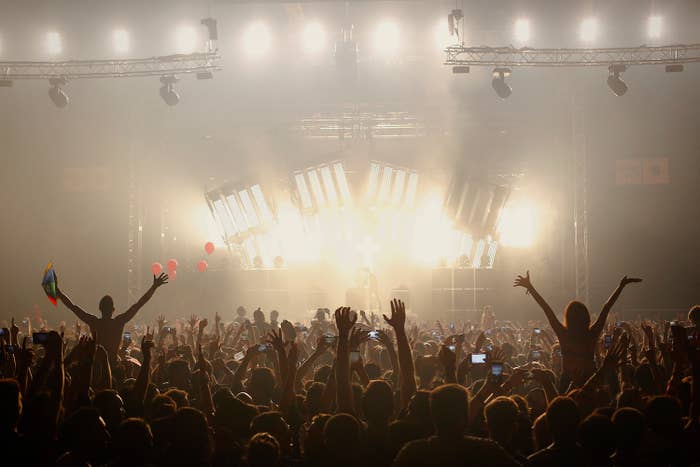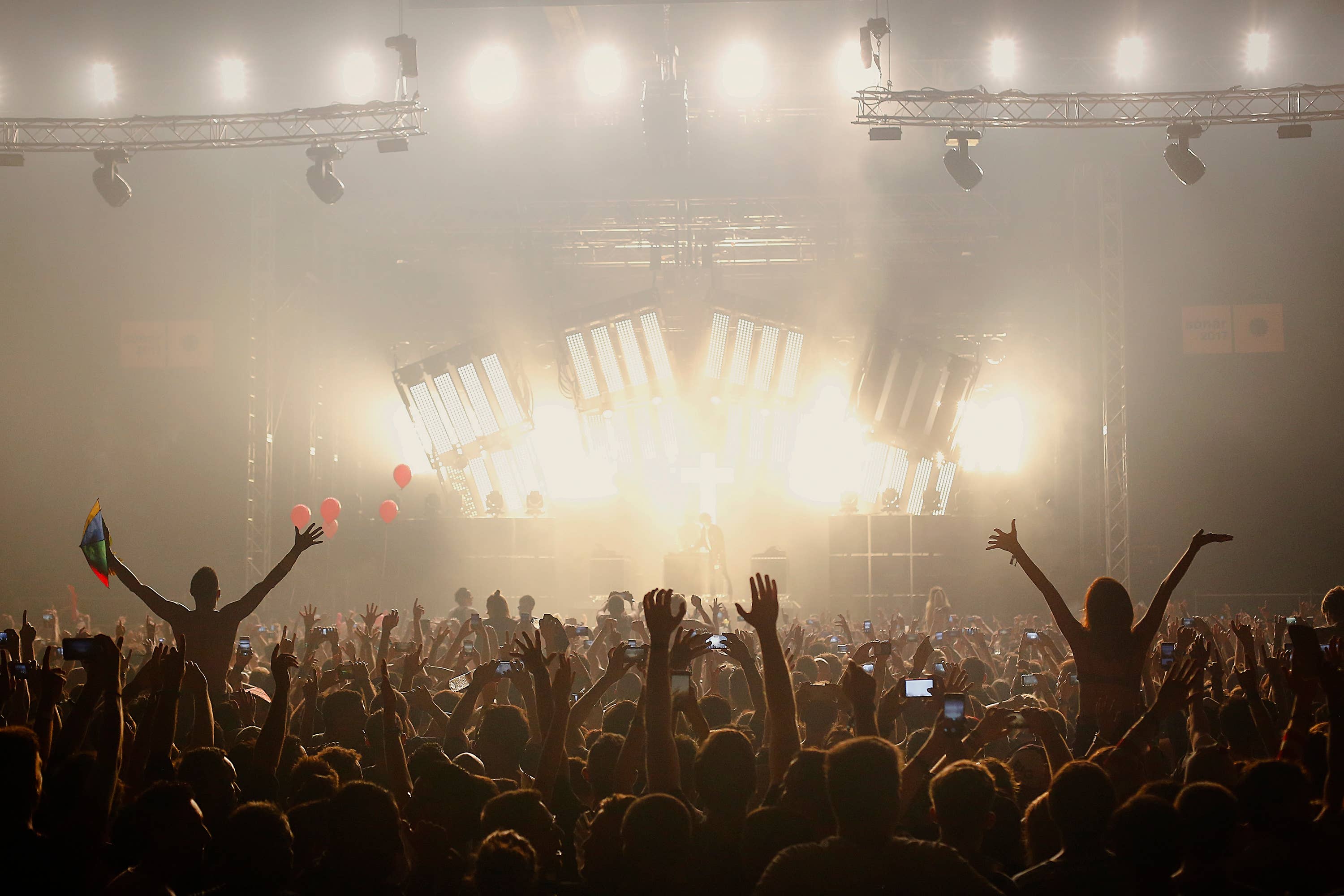
Established before the internet had even been conceptualised, Sónar is a festive incubator of ambitious and unbridled creativity and intelligent talent. Founded by friends and fanatical music heads Ricard Robles, Enric Palau, and Sergi Caballero, these three entrepreneurs first came together with the original intention of creating an international meeting point in Barcelona for inspired, social and progressive minds to cross paths and party. Since the launch of their advanced music and multimedia art convention, Sónar festivals have been programmed across London, Chicago, Buenos Aires, São Paulo, Hamburg, Bogota, New York, Seoul, Rome, Cape Town, Copenhagen, Tokyo and Hong Kong.
Staged to a backdrop of carefully curated music sets, workshops, installations and lectures, Sónar has famously hosted a roster of the world's most accomplished artists, including Bjork, Kraftwerk, The Chemical Brothers, A$AP Rocky, New Order, FKA twigs and Diplo. Turning 25 years old this summer, Sónar reflects back on an incredible legacy of influential, forward-thinking music, art and literature-led initiatives. Hosting an exhibition entitled No Flyers, No Posters, and curating a transmission sent via sound-waves to the outter realms of space under the moniker Sónar Calling, the bold ambitions of Sónar remain as future-thinking as they were from day dot.
Today, Sonar celebrates the past by encouraging audiences to protect our future with a sustainable and humanistic approach to partying. Complex talks to Enric, one third of the brains behind this otherworldly operation, to understand where the sound movement that is Sonar will take us next.

How long has Sónar Calling been in curation and what was the original inspiration behind the project?
Sónar Calling actually originated from my partner, Sergio Albiac. He usually works on the marketing campaigns every year. It took a year to organise the project with two scientific teams, to define the project's aims and then for us to find an antenna that would allow for us to make the transmission. Everything was very challenging. At Sónar, we are driven by art and music inspirations, and to get permission to create this transmission was outside of our realm of experience and expertise. Locating an antenna itself was hard enough; you can't simply rent an antenna if you aren't working on a scientifically-driven project. We needed to be backed up by an accomplished scientific team, and we were from the very beginning. After that point, we chose a planet to transmit to—a planet that was close enough to earth to make this feasible. We located a planet 2.5 light years away and we started curating the transmission.
We selected eight artists that had a connection with the festival who best represented our varied design aesthetic: we have a tech rave and Black Madonna in the same line-up this year, and Jaques Michele Jarre was someone we passionately wanted to work with on Sónar Calling. All the selected artists were delighted and felt positive to be involved, and we wanted them to feel totally free in whatever they wanted to construct. The brief was to deliver a 10-second production piece of music, and after this we asked them why they made this personal piece. You can read more about this process if you look under the 'interviews with artists' section on our website, which elaborates on what they created. It is very diverse. We worked on Sónar Calling like a mathematic question that hopefully will tap into an intelligence and make contact with another planet. The main meaning of the festival, the music we have platformed for 25 years, is to celebrate the present. We have never been nostalgic—we are thinking forward, not back, targeting a planet to find a response.
Do you feel changed by such a unique project?
I feel very proud that we are gathering scientific information to present to a wider audience. Even after working with scientists for one year, I feel I have learned and understood a way of thinking which I hadn't known before. For example, I was told after leaving the solar system, people experience an emptiness of this wide black space which they call "the dark energy." The concept of dimension is impressive. If we can make more people aware how pure our planet is, which is the only planet on which we can live and survive, it will matter. As humans, we are not treating the planet very well: we are killing each other, and killing the planet.
Astronauts say that after leaving earth and spending time looking back on the planet, they return with a deeper understanding of what it means to be a human being, that they feel we need to get together to protect what we have and protect each other. This sounds romantic but it needs to be real, and we want people to think about that. Sónar is a celebration, and we want people to have fun. We're explaining these ecological and scientific theories, and delivering humanist messages, but at the same time, we are creating an environment for people to have fun.
When you first started Sónar, what were your ambitions for progressing culture on a wider scale beyond the music?
We started Sónar with the ambition to create an international meeting point devoted to creativity and technology. That was the original concept. We then went deeper and became more complex in our thinking. I like to think we are moving forward through the hands and brains of artists who are very involved in the scientific and technological development of Sónar. Our festival helps audiences understand how evolution is happening, through technology. It's very interesting, socially, to see how we have participated in the democracy of technology. When computers first appeared, they wereN'T affordable. Now 700 Euros, and you have everything in a laptop or iPad, and this has created big changes with artists' creativity and production.
People can write, record, mix and then release a piece of music independently onto the internet, and that is amazing! It has changed the music industry. We're not compromising on the quantity or quality of music being released, we just have more diversity and selection. This has changed the way we programme Sónar: we have more members in our team now, and have antennas to transmit the festival to places like Hong Kong, Buenos Aires, and Tokyo. It has been so revolutionary to see how technology has expanded the festival's reach.
When you look back over the legacy of Sónar—via the exhibition staged at this year's festival, No Flyers, No Posters, what resonates the most strongly for you about Sónar's own evolution?
The first campaign we worked on was in 1997, and was about moving from feeling synthetic to being organic, with images showing old people carrying vinyl DJ boxes with them. The people in the pictures are our parents; my mother and father would come to each festival and people would stop them and ask them for a picture [laughs]. It was very fun. It was the idea of anti-celebrity in terms of our campaign and, since then, Sergio has created some brilliant ideas that have followed. It was incredible to reach Maradona. It was complicated, but we reached one of the most famous people in the world at that time. In 2002, if you googled the five most famous people in the world, it was the Pope, Michael Jackson, I can't remember the other two, but Maradona was the fifth person. In the end, he didn't do it for the money but rather he had a sense of allegiance with Sónar.
Reflecting on the past and looking towards the future, what else do you have left to achieve in the next 25 years?
I have no clue! I have some iconic memories from the last 25 years: meeting the Beastie Boys, hanging out with them in their studio in NYC, and then bringing them to the festival was a big one. Meeting personalities, real people, the genuinely really kind and gentle people behind big artists, knowing such good souls has been good for me also on a personal level. Meeting Nile Rogers, working with Matthew Herbert—who is a good friend of mine—their love of music, on a personal level, is just amazing. The future is now in the bedroom studio—an unknown kid, in some city, is proposing the future, and that is how we communicate with our audience. The future is in the minds-eye of these new artists and I cannot predict where that will take us.
One thing I can predict is that the live show itself will always be important. l can't see an artificial replacement for live music. The physicality of music and imagery you experience at a show or a DJ set has no replacement—YouTube cannot recreate that whole experience. There is no equivalent technology that will recreate the feeling a festival perpetuates, and that is why why we are obsessed with the quality of sound. At Sónar, our timetable is live a movie; it all starts quiet, then goes to a drama and then a crescendo and then the calm after the storm. We think about the way we schedule artists very closely. We think very deep into the emotional experiences we facilitate.
Who instilled in you your deep love of music, and do you have a protégé that you're also inspiring to continue your journey through your work at Sónar?
The first records I discovered came via my older brother. The first record I ever owned was a double record by Elvis Presley, which was a gift from my aunt—then it was Bob Marley and Micheal Jackson, both of whom inspired me a lot. I began buying records with friends, sporadically. Then, every weekend, we were buying 7-inch vinyl's from Planet Music. Now I have two kids: 17 and 20, and we always play music to them. We play adult music, a mix of everything, and they are very critical about music; they listen to a lot of urban music now. We have very young people at Sónar who work on the team, and they are our legacy—they have great ideas and brilliant approaches to progressing our future and I think it's going to be a movement perpetuated from these people within the team.
Sónar takes place in Barcelona, from June 14 - 17. For tickets and more info, head here.

